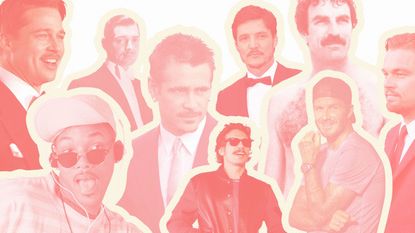
Early on in the new HBO dark comedy Divorce, Sarah Jessica Parker's character struggles to give her husband a precise moment when their relationship hit its expiration date. "Perhaps when you grew the mustache," she finally suggests, trying to sound as non-combative as possible. It's meant to be a moment of levity, but the truth is: A mustache is a pretty big follicular/relationship/cultural deal.
Thomas Haden Church, who plays the husband, told MarieClaire.com that it was his idea to grow the 'stache—it helped with his character's backstory (he plays a former Wall Streeter): "We always wanted to create a little bit of a '70s timelessness," he says. "That's sort of the period of when we all crossed the threshold of not being kids and being young adults. Mustaches were way more fashionable in the '70s."
In all fairness to Church, that's a biiiiit of an understatement. It's not just that mustaches were more fashionable in the '70s, it's that they represented rugged grittiness—the titillating dangers of the sexual revolution. Basically, unwashed Baby Boomers rebelled against trimmers as much as they rebelled against the conflict in Vietnam. It was a time when Burt Reynolds—his furry frame exposed, brushed, and glistening with nary a hint of razor burn—could lounge on a bearskin rug for a magazine centerfold with a cigarette dangling suggestively from his lips and still be thought of as an American sex symbol instead of a B-league bowler.
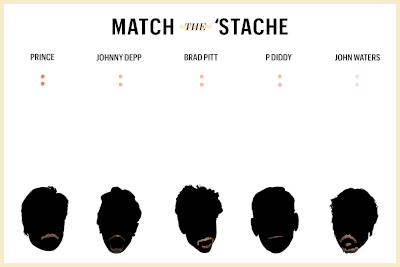
But, as with every trend, mustache love is cyclical. Beauty historian Victoria Sherrow writes in Encyclopedia of Hair: A Cultural History that facial hair was all the rage in ancient Greece until Alexander the Great shaved his, and subsequently banned beards on his soldiers (supposedly, fun fact, to make it harder for enemies to grab them). Before that it was allegedly worn by cavemen for warmth, intimidation, and protection. Long after, in 14th-century England, mustaches became so stylish that knights had their armor custom-made to accommodate them—an effigy in Canterbury Cathedral depicts a fully armored Prince Edward taking a back seat to his own glorious mustache, which is long and full and rests fluffily atop his chainmail coif.
Nowadays, mustaches don't message "warrior" so much as "dad." New NBC series This Is Us uses Milo Ventimiglia's lip sweater to telegraph that his character is a father of three with a desk job. Then there's also the mustachioed trope of "cranky middle-aged man," à la Nick Offerman and his epically grumpy Parks and Rec 'stache. All of which is to say, we've come a long, long way from whiskers' latest heyday. We're in, shall we say, the ebb part of the ebb-and-flow cycle.
"Mustaches are usually gross," confirms Los-Angeles based journalist Elina Shatkin. "They make you look like you're a member of the Village People or a gross hipster. Take your fancy mustache wax and GTFO."
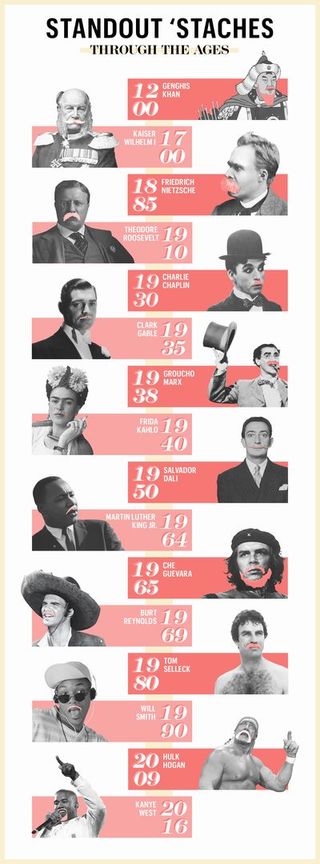
Women, on the whole, seem to agree with her. A 2013 survey found that only 25% of women have a positive opinion of mustaches, and a hilariously comprehensive 2016 version contains findings like: most women have "no idea" what a mustache-wearing man wants; women think men with mustaches look like they're trying too hard; most women think the era of the mustache is over; some women will go so far as to dump a guy because of his facial hair.
Stay In The Know
Marie Claire email subscribers get intel on fashion and beauty trends, hot-off-the-press celebrity news, and more. Sign up here.
But it's the debates about hygiene in which the cards are truly stacked against the furry-faced. Last year's report that facial hair may actually be germ-y cesspools of fecal matter got plenty of play, while a new study from 2016 that claims facial hair protects against bacteria barely made a dent.
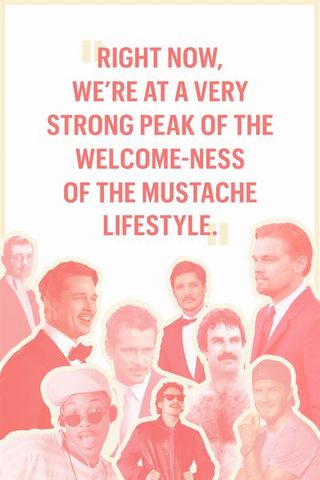
"I'm turned off by facial hair because of chafing. It can look sexy from afar (hello, half the cast of Game of Thrones), but then you go to deal with it and it's like a hot, dirty mess," says Burbank-based esthetician Cybil Solyn. "I think lots of women just cringe at the idea of it scraping against their delicate skin and lady bits. I hear a lot of complaining about men not shaving enough. Here we are taking all the hair off, keeping our skin pretty, keeping everything smooth, and we get a sand-paper face coming at us?"
(Solyn—who can't help but do her job as an esthetician—adds that if you do get a rash after hooking up with a mustache, you should "use a cool wet wash cloth applied to the irritated area, and then level up with an oatmeal, mud, or gel cooling mask with the same damp wash cloth on top." Those who get really bad flare-ups are probably "dealing with a histamine reaction and Benadryl works great for that.")
Still, no one is arguing that mustaches don't have a certain mysterious power: One of the reasons the internet made us care about undecided voter Ken Bone for a day or two of the 2016 election cycle was because of his slender, arched, neatly groomed facial hair.
"The mustache does come in peaks and valleys," says Adam Causgrove, chief executive of the American Mustache Institute, the organization that nominated Bone for its annual Robert Goulet Memorial Mustached American of the Year award (he didn't win). "Right now, we're at a very strong peak of the welcome-ness of the mustache lifestyle."
Hmmm. We'll see about that.
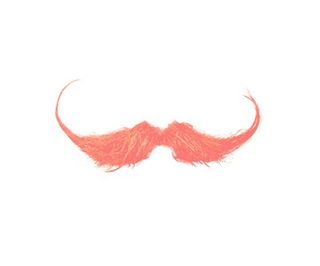
-
 Anne Hathaway Details the "Gross" Audition Request She Once Endured
Anne Hathaway Details the "Gross" Audition Request She Once Endured"Now we know better."
By Meghan De Maria Published
-
 The Emotional Ending of 'Baby Reindeer,' Explained
The Emotional Ending of 'Baby Reindeer,' ExplainedNetflix's latest miniseries from Richard Gadd is based on the true story of the comedian and his stalker.
By Quinci LeGardye Published
-
 The Must-Visit Hair Colorists in New York City
The Must-Visit Hair Colorists in New York CityI trust these talented colorists implicitly.
By Sophia Vilensky Published
-
 The 32 Best Hair Growth Shampoos of 2024, According to Experts
The 32 Best Hair Growth Shampoos of 2024, According to ExpertsRapunzel hair, coming right up.
By Gabrielle Ulubay Published
-
 The 20 Best Hair Masks for Damaged Hair, According to Experts and Editors
The 20 Best Hair Masks for Damaged Hair, According to Experts and EditorsHealthy strands, here we come!
By Gabrielle Ulubay Last updated
-
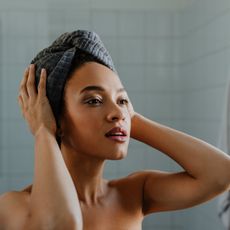 How Often You Should Wash Your Hair, According To Experts
How Often You Should Wash Your Hair, According To ExpertsKeep it fresh, my friends.
By Gabrielle Ulubay Published
-
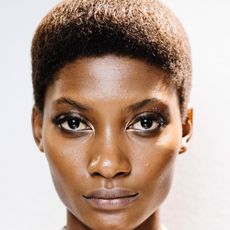 The 11 Best Magnetic Lashes of 2023
The 11 Best Magnetic Lashes of 2023Go ahead and kiss your messy lash glue goodbye.
By Hana Hong Published
-
 Beauty Advent Calendars Make the Perfect Holiday Gift
Beauty Advent Calendars Make the Perfect Holiday GiftThe gift that keeps on giving.
By Julia Marzovilla Last updated
-
 The 18 Best Natural Hair Products in 2023
The 18 Best Natural Hair Products in 2023Remember: Your curls are your crown.
By Gabrielle Ulubay Published
-
 The 9 Best Hot Rollers for the Curls of Your Dreams
The 9 Best Hot Rollers for the Curls of Your DreamsThis is how we roll.
By Samantha Holender Published
-
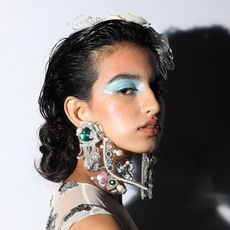 The 12 Best Cream Eyeshadows, According to Makeup Artists
The 12 Best Cream Eyeshadows, According to Makeup ArtistsThe best part? They’re so easy to apply.
By Samantha Holender Published